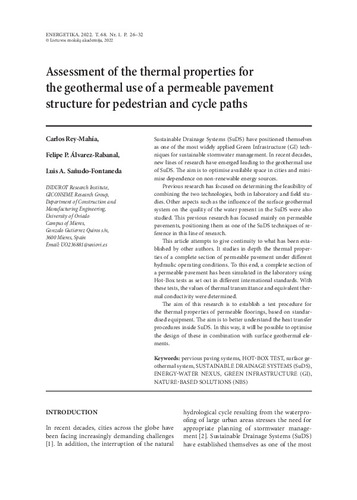Assessment of the thermal properties for the geothermal use of a permeable pavement structure for pedestrian and cycle paths
Autor(es) y otros:
Palabra(s) clave:
pervious paving systems
surface geothermal system
sustainable drainage systems
energy-water nexus
nature-based solutions
green infrastructure
Fecha de publicación:
Editorial:
Lietuvos mokslų akademija
Versión del editor:
Citación:
Descripción física:
Resumen:
Sustainable Drainage Systems (SuDS) have positioned themselves as one of the most widely applied Green Infrastructure (GI) techniques for sustainable stormwater management. In recent decades, new lines of research have emerged leading to the geothermal use of SuDS. The aim is to optimise available space in cities and minimise dependence on non-renewable energy sources. Previous research has focused on determining the feasibility of combining the two technologies, both in laboratory and field studies. Other aspects such as the influence of the surface geothermal system on the quality of the water present in the SuDS were also studied. This previous research has focused mainly on permeable pavements, positioning them as one of the SuDS techniques of reference in this line of research. This article attempts to give continuity to what has been established by other authors. It studies in depth the thermal properties of a complete section of permeable pavement under different hydraulic operating conditions. To this end, a complete section of a permeable pavement has been simulated in the laboratory using Hot-Box tests as set out in different international standards. With these tests, the values of thermal transmittance and equivalent thermal conductivity were determined. The aim of this research is to establish a test procedure for the thermal properties of permeable floorings, based on standardised equipment. The aim is to better understand the heat transfer procedures inside SuDS. In this way, it will be possible to optimise the design of these in combination with surface geothermal elements.
Sustainable Drainage Systems (SuDS) have positioned themselves as one of the most widely applied Green Infrastructure (GI) techniques for sustainable stormwater management. In recent decades, new lines of research have emerged leading to the geothermal use of SuDS. The aim is to optimise available space in cities and minimise dependence on non-renewable energy sources. Previous research has focused on determining the feasibility of combining the two technologies, both in laboratory and field studies. Other aspects such as the influence of the surface geothermal system on the quality of the water present in the SuDS were also studied. This previous research has focused mainly on permeable pavements, positioning them as one of the SuDS techniques of reference in this line of research. This article attempts to give continuity to what has been established by other authors. It studies in depth the thermal properties of a complete section of permeable pavement under different hydraulic operating conditions. To this end, a complete section of a permeable pavement has been simulated in the laboratory using Hot-Box tests as set out in different international standards. With these tests, the values of thermal transmittance and equivalent thermal conductivity were determined. The aim of this research is to establish a test procedure for the thermal properties of permeable floorings, based on standardised equipment. The aim is to better understand the heat transfer procedures inside SuDS. In this way, it will be possible to optimise the design of these in combination with surface geothermal elements.
Patrocinado por:
This investigation was funded by the FICYT through the GRUPIN project; grant number AYUD/2021/51328, co-financed with EU FEDER funds. Carlos Rey-Mahía would like to thank the University of Oviedo for the Predoctoral Grant with reference PAPI-21-PF-23. The authors also thanks SUDS S.L. and Atlantis Corp for providing the lightweight modular tank structural systems used in one of the cross-sections of the laboratory models.
Colecciones
- Artículos [37548]
- Construcción e Ingeniería de Fabricación [508]
- Investigaciones y Documentos OpenAIRE [8420]
Ficheros en el ítem




